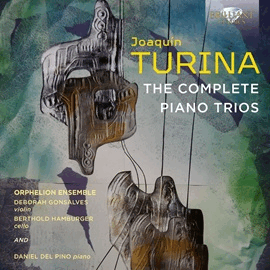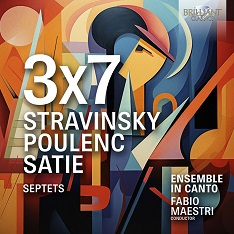Europa nach dem Ersten Weltkrieg und den wenigen Jahrzehnten bis zur nächsten Katastrophe war ein komplett umgeformtes Europa: geopolitisch, ökonomisch und gesellschaftlich. Die Musikwelt reagierte mit neuen Formen, neuen Klängen auf den Untergang der alten Welt und die sich breit machende Ungewissheit bis hin zur Depression. Ein Mittel, sich dieser Situation zu stellen, waren die Ironie, der Sarkasmus oder der Dadaismus – die Anti-Kunst.
Diese Lust am Experiment, am Grotesken, stellenweise auch am Morbiden bildet den inhaltlichen roten Faden des neuen Albums von In Canto. Die sieben Musiker haben hörbar ihren Spaß an diesem Genre. Kein Spaß zum Schenkel klopfen, sondern an der immer wiederkehrenden Absurdität, der Skurrilität etwa der beiden Werke von Erik Satie. Dabei bewegt In Canto sich stets stilsicher in den unterschiedlichsten Formaten, seien es Elemente von Rag und Swing, verfremdete Walzer und Masurken oder formenstrenge Anlehnungen an Bach wie im abschließenden Septett von Stravinsky.
Die Stärke der Interpretationen liegt sonder Zweifel in der ausgefeilten Balance, das Groteske und seinen eigentlich ernsten Hintergrund nicht durch Unaufmerksamkeit der Lächerlichkeit preiszugeben.
Europe after the First World War and in the few decades before the next catastrophe was a completely changed Europe: geopolitically, economically and socially. The musicians responded with new forms and new sounds to the end of the old world and the spreading uncertainty and even depression. One way of dealing with this situation was through irony, sarcasm or Dadaism – anti-art.
This desire to experiment, to be grotesque and sometimes even morbid is the central theme of In Canto’s new album.
The seven musicians clearly have fun with this genre. It’s not fun to slap one’s thighs, but to enjoy the recurring absurdity and bizarreness of, for example, the two works by Erik Satie. In Canto always moves with stylistic confidence in a wide variety of formats, be it elements of rag and swing, distorted waltzes and mazurkas, or formal leanings toward Bach, as in the final septet by Stravinsky.
The strength of the interpretations is undoubtedly in the subtle balance of not exposing the grotesque and its actually serious background to ridicule through inattention.


















